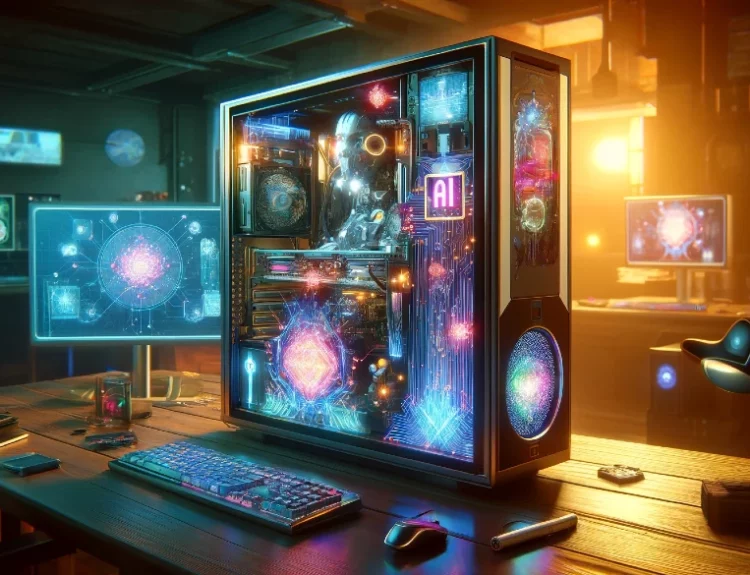Introduction
Have you ever stopped to think about your computer’s name? Beyond the generic “DESKTOP-123” or the manufacturer’s default, does it have a name that reflects its purpose or sparks a connection? In today’s world of personalized technology, even our computers deserve names that stand out. This is where the exciting field of Artificial Intelligence (AI) steps in, revolutionizing the way we name our digital companions.
Imagine an AI-powered system that can generate unique, memorable names for your computers, names that not only sound cool but also enhance your user experience. AI computer names are no longer science fiction. Advanced AI algorithms are being used to develop innovative naming conventions, creating a future where technology becomes more user-friendly and engaging.
This blog will explore the fascinating world of AI-driven naming systems and delve into the various ways intelligent naming solutions are transforming the way we name our computers. We’ll uncover the benefits of AI applications in generating names, explore the future of AI in naming technology, and discover how AI can even optimize names for search engines.
The Rise of AI in Naming Systems
For years, computer names have been a realm of predictable monotony. We’ve all encountered the dreaded “DESKTOP-XXX” or the manufacturer’s unimaginative defaults. These generic labels fail to capture the essence of our increasingly sophisticated machines. However, a revolution is brewing – a revolution powered by Artificial Intelligence (AI).
Traditional naming methods often fall short. Repetitive sequences and a lack of creativity lead to forgettable names that do little to inspire. Here’s where AI shines:
- Unleashing Creativity: AI can tap into vast reserves of language data, generating unique and memorable names that wouldn’t occur to the human mind. Imagine an AI that can craft names that reflect your computer’s function, personality, or even your own preferences!
- Boosting Efficiency: The naming process can be a time-consuming task. AI streamlines this process by churning out a multitude of options in mere seconds. This allows you to quickly identify the perfect name without the tedious brainstorming sessions.
- Branding Powerhouse: AI can be trained to understand brand identity, ensuring the generated names perfectly align with your overall tech ecosystem. This creates a sense of cohesion and strengthens brand recognition.
But how does AI achieve this magic? The secret lies in sophisticated algorithms like Natural Language Processing (NLP) and Machine Learning (ML). NLP allows AI to understand the nuances of human language, while ML lets AI learn from existing naming data, constantly refining its ability to generate the perfect moniker.
Innovations in AI-powered Nomenclature
The realm of AI-powered computer naming is brimming with exciting innovations. Here, we delve into some of the most groundbreaking applications:
- Personalized Naming: Forget generic labels! AI can be trained to generate names based on user preferences. Imagine an AI that asks you about your computer’s purpose (gaming, work, creative) or even its “personality” (serious, playful, efficient) and then creates a name that perfectly embodies those traits.
- SEO Savvy Names: In today’s digital landscape, searchability is key. AI can be programmed to optimize computer names for search engines. This means your AI-generated name could not only be catchy but also help others discover your computer on a network or online storage platforms.
- Conflict Aversion: No one wants a naming headache. AI can be trained to check for trademark conflicts before presenting you with a final name. This ensures your computer’s name is unique and legally sound.
These are just a few examples of the innovative ways AI is transforming computer naming. Real-world examples are already starting to emerge. Imagine an AI system that generates a name like “Nova” for your powerful gaming PC or “Muse” for your creative workstation. The possibilities are truly endless!
Enhancing Identity with AI-generated Names
Names have a powerful psychological impact. They create a sense of identity and connection. This extends even to the digital realm. A computer named “Workhorse” evokes a sense of reliability and power, while “Starlight” suggests creativity and inspiration. The right name can subconsciously influence how we interact with our computers.
AI can be a powerful tool for crafting names that resonate with us. Here’s how:
- Understanding User Psychology: AI can be trained on vast amounts of data to understand the psychological associations of different words and names. By analyzing user preferences and demographics, AI can generate names that tap into our emotions and create a deeper connection with our computers.
- Reflecting Purpose: AI can analyze the specific function of a computer and generate a name that reflects its purpose. This could be a technical name for a work computer or a whimsical name for a gaming PC. This not only enhances organization but also creates a sense of purpose for each machine.
Ultimately, AI-generated names can go beyond mere labels; they can become an extension of our digital identity, fostering a more personal and engaging user experience.
The Future of AI in Naming Technology
The future of AI in naming technology is brimming with possibilities. Here’s a glimpse of what’s to come:
- Advanced AI Systems: As AI technology continues to evolve, we can expect even more sophisticated naming systems. Imagine AI that can not only generate names but also understand the cultural and emotional nuances behind them, ensuring names resonate across different demographics and languages.
- Evolving with User Interaction: AI thrives on data. The more users interact with AI-powered naming systems, the more the AI learns and adapts. This constant learning process will lead to ever-more creative and personalized naming solutions.
- Ethical Considerations: As AI-generated names become more prevalent, ethical considerations will become increasingly important. Ensuring AI-generated names are culturally sensitive and avoid unintentional biases will be crucial.
The future of AI in naming technology is not just about generating cool names; it’s about creating a seamless and personalized experience for users. AI will play a significant role in shaping the way we interact with our computers and the digital world around us.
Join the Discussion with Verdict
At Verdict, we believe the future of AI lies in collaboration. We’re not just building another AI platform; we’re crafting a future where Machine Learning (ML) and Artificial General Intelligence (AGI) evolve through real-world interactions and the collective wisdom of our community.
Every AI Search, AI Chat, and shared result on Verdict contributes to building an AI that understands and grows alongside you. These interactions become building blocks, shaping the future of AI in naming technology and beyond.
Join the Verdict community today and be part of this exciting journey! Help us develop an AI that reflects our diversity, learns from our experiences, and expands with our collective knowledge. Together, let’s create a future where AI personalizes not just computer names, but every aspect of our digital interactions.
Conclusion
The rise of AI in naming systems marks a significant shift in how we interact with technology. AI offers a powerful tool for generating unique, memorable, and even emotionally resonant names for our computers. These AI-powered names have the potential to enhance user experience, streamline workflows, and forge a deeper connection with our digital companions.
The future of AI in naming technology is brimming with possibilities. As AI continues to evolve and learn from user interaction, we can expect even more sophisticated and personalized naming solutions.
Stay tuned for more fascinating explorations of AI! Visit our blog page for engaging content like “AI Revolution: Exploring NVIDIA’s Role in Computer Technology” and “Unveiling the Artistry: AI in Computer Generated Images,” and many more!
We hope you enjoyed this exploration of AI’s role in computer names. Let us know your thoughts in the comments below!










